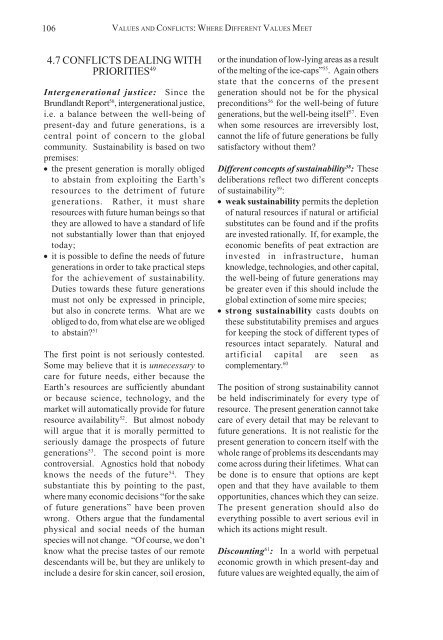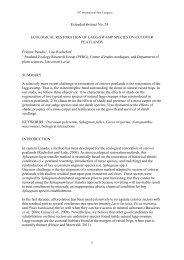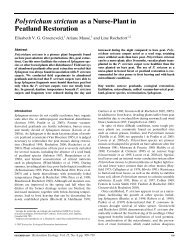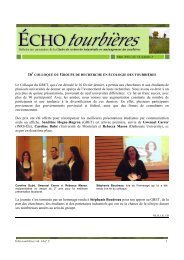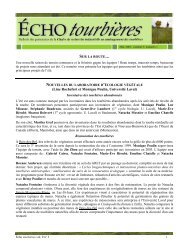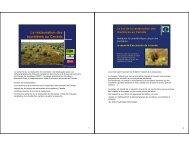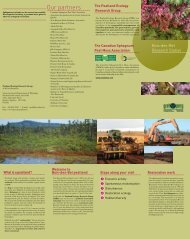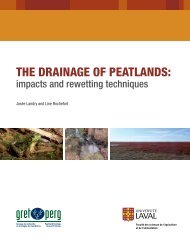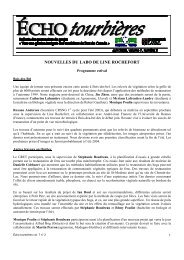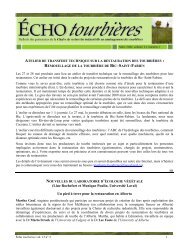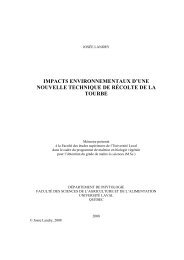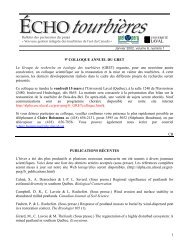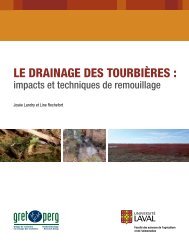wise use of mires and peatlands - Peatland Ecology Research Group
wise use of mires and peatlands - Peatland Ecology Research Group
wise use of mires and peatlands - Peatland Ecology Research Group
You also want an ePaper? Increase the reach of your titles
YUMPU automatically turns print PDFs into web optimized ePapers that Google loves.
106 VALUES AND CONFLICTS: WHERE DIFFERENT VALUES MEET4.7 CONFLICTS DEALING WITHPRIORITIES 49Intergenerational justice: Since theBrundl<strong>and</strong>t Report 50 , intergenerational justice,i.e. a balance between the well-being <strong>of</strong>present-day <strong>and</strong> future generations, is acentral point <strong>of</strong> concern to the globalcommunity. Sustainability is based on twopremises:● the present generation is morally obligedto abstain from exploiting the Earth’sresources to the detriment <strong>of</strong> futuregenerations. Rather, it must shareresources with future human beings so thatthey are allowed to have a st<strong>and</strong>ard <strong>of</strong> lifenot substantially lower than that enjoyedtoday;● it is possible to define the needs <strong>of</strong> futuregenerations in order to take practical stepsfor the achievement <strong>of</strong> sustainability.Duties towards these future generationsmust not only be expressed in principle,but also in concrete terms. What are weobliged to do, from what else are we obligedto abstain? 51The first point is not seriously contested.Some may believe that it is unnecessary tocare for future needs, either beca<strong>use</strong> theEarth’s resources are sufficiently abundantor beca<strong>use</strong> science, technology, <strong>and</strong> themarket will automatically provide for futureresource availability 52 . But almost nobodywill argue that it is morally permitted toseriously damage the prospects <strong>of</strong> futuregenerations 53 . The second point is morecontroversial. Agnostics hold that nobodyknows the needs <strong>of</strong> the future 54 . Theysubstantiate this by pointing to the past,where many economic decisions “for the sake<strong>of</strong> future generations” have been provenwrong. Others argue that the fundamentalphysical <strong>and</strong> social needs <strong>of</strong> the humanspecies will not change. “Of course, we don’tknow what the precise tastes <strong>of</strong> our remotedescendants will be, but they are unlikely toinclude a desire for skin cancer, soil erosion,or the inundation <strong>of</strong> low-lying areas as a result<strong>of</strong> the melting <strong>of</strong> the ice-caps” 55 . Again othersstate that the concerns <strong>of</strong> the presentgeneration should not be for the physicalpreconditions 56 for the well-being <strong>of</strong> futuregenerations, but the well-being itself 57 . Evenwhen some resources are irreversibly lost,cannot the life <strong>of</strong> future generations be fullysatisfactory without them?Different concepts <strong>of</strong> sustainability 58 : Thesedeliberations reflect two different concepts<strong>of</strong> sustainability 59 :● weak sustainability permits the depletion<strong>of</strong> natural resources if natural or artificialsubstitutes can be found <strong>and</strong> if the pr<strong>of</strong>itsare invested rationally. If, for example, theeconomic benefits <strong>of</strong> peat extraction areinvested in infrastructure, humanknowledge, technologies, <strong>and</strong> other capital,the well-being <strong>of</strong> future generations maybe greater even if this should include theglobal extinction <strong>of</strong> some mire species;● strong sustainability casts doubts onthese substitutability premises <strong>and</strong> arguesfor keeping the stock <strong>of</strong> different types <strong>of</strong>resources intact separately. Natural <strong>and</strong>artificial capital are seen ascomplementary. 60The position <strong>of</strong> strong sustainability cannotbe held indiscriminately for every type <strong>of</strong>resource. The present generation cannot takecare <strong>of</strong> every detail that may be relevant t<strong>of</strong>uture generations. It is not realistic for thepresent generation to concern itself with thewhole range <strong>of</strong> problems its descendants maycome across during their lifetimes. What canbe done is to ensure that options are keptopen <strong>and</strong> that they have available to themopportunities, chances which they can seize.The present generation should also doeverything possible to avert serious evil inwhich its actions might result.Discounting 61 : In a world with perpetualeconomic growth in which present-day <strong>and</strong>future values are weighted equally, the aim <strong>of</strong>


